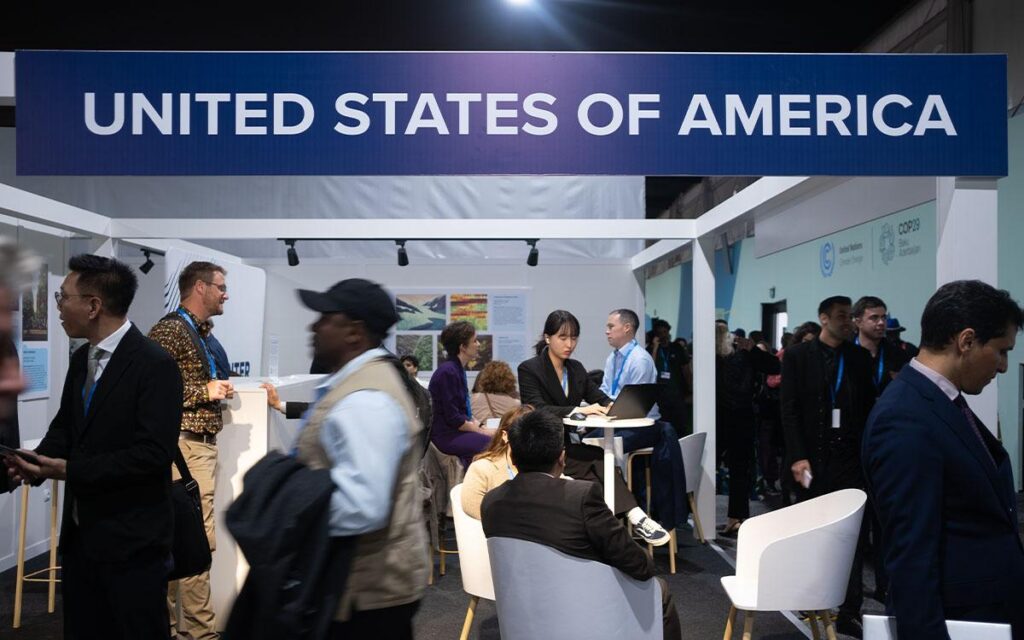US Climate Allies Focus on Economics Amid Political Shift
SIERRA-Julia
Fri, 2024-11-15 09:24

At COP29, the US has a comparatively tiny presence. Biden is absent, overshadowed by Trump’s plans to expand fossil fuel use and rescind funds from the Inflation Reduction Act. | Photo by Nour Ghantous
The United States’ climate leaders arrived in Baku, Azerbaijan, for COP29 negotiations on climate financing. With President Joe Biden’s predecessor, a climate skeptic, set to return to office, the US delegation’s message is uncertain.
The US delegation can highlight Biden’s Inflation Reduction Act (IRA), which has inspired other countries, like Canada, to implement their own climate action policies. Domestically, the IRA has created economic opportunities and outlines a path for emissions reduction, aiming to cut US greenhouse gas emissions by 50-52% by 2030.
President-elect Trump has pledged to rescind IRA funds and expand oil and gas licensing, potentially withdrawing again from the Paris Agreement. This contrasts with the US’s role in the 2015 Paris Agreement, which commits countries to emissions reduction plans and climate funding.
With Trump’s return looming, international delegates question US climate commitments and seek answers from the delegation.
From Moral Imperative to Economic Incentive
At COP29, US climate allies emphasize the economic benefits of climate action over moral imperatives. The focus is on the financial gains from clean energy investments and the cost efficiency of mitigating climate disasters. Conversations at the conference support this, noting Biden’s campaign could have highlighted the IRA’s financial benefits more effectively.
The IRA has created jobs and investments, with 85% of new projects and 68% of jobs in red states. A report by US advocacy group E2 indicates nearly 110,000 new jobs and $126 billion in investment in 40 states, with many projects in Republican-led areas.
Climate allies hope the financial benefits of the IRA will be too significant for the incoming administration to ignore.
The States May Take the Reins
Under Trump, states may need to fill a potential federal leadership gap on climate action. California’s environmental secretary, Yana Garcia, defended the state’s efforts at COP29 and noted potential legal action against federal decisions.
Garcia countered claims that US climate progress is at risk, emphasizing California’s commitment to its environmental agenda. She highlighted the economic opportunities of the IRA and called dismantling it a “deep mistake.”
According to 2020 data, California is the second-largest greenhouse-gas-emitting state in the US but is also heavily impacted by climate change, facing extreme heat, wildfires, and poor air quality.
Weathering Changing Political Winds
Biden’s climate advisor, Ali Zaidi, expressed confidence in states, cities, and the private sector recognizing the economic opportunities from clean energy. The US delegation at COP29 emphasizes that the financial rewards from clean energy investments are too significant to undo, warning that dismantling the IRA would harm both environmental and economic opportunities.
Zaidi noted the potential of the crisis to expand manufacturing, uplift communities, and deliver clean air and water. The shift from climate morality to economic pragmatism is seen as a counter to potential rollbacks of climate progress. The IRA’s impact spans emissions reductions, job creation, and international influence, with hopes that these outcomes will persist beyond the current administration.
As COP29 continues, the future of American climate policy remains crucial, influencing global climate action and finance.
Original Story at www.sierraclub.org
